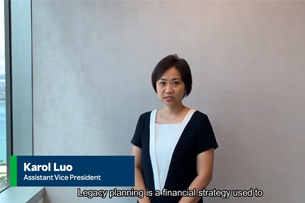In tailoring life protection solutions for over 10 years, PCS by Mercer Senior Vice President, Isaac Lim, has had countless conversations with people holding private wealth. He thinks their perspectives and priorities are subtly shifting.
Here, Isaac reflects on the changes he is seeing.
US$68 trillion – the equivalent of the combined GDP of the world’s 25 wealthiest nations – is in the process of moving.
From the “Baby Boomer” generation down to their children, the greatest wealth transfer in human history1 is so immense, it has no easy analogy. The sheer magnitude of the flow of wealth, however, does conjure mental images of the epic wildebeest migration through the Serengeti-Mara ecosystem.
The animals – stretching as far as the eye can see – flow inexorably through the landscape. Their majestic journey changes everything in its wake. As they travel in search of greener pastures, wildebeest calves are born, and wildebeest calves are taken by predators, life, and the collateral damage for life, evident in every moment.
In the lives of the high and ultra-high net worth, what is the collateral damage of wealth? How much stress and time were needed to acquire that wealth? Moreover, is the life they invested in asset accumulation the life they want for their children?
These are the questions we see more and more PCS clients asking themselves as they prepare to retire and transfer their asset holdings to the next generation.
Yes, our clients are still concerned about what they leave their children, but increasingly, UHNW individuals are also reflecting on and prioritizing their children’s futures over family succession.
Asset not Liability
In North Asia, where there has been an explosion of wealth in the past decades, the business landscape and opportunities have changed dramatically. Compared with the “Boomer” generation, there is now much more competition, higher labor costs, increased compliance and regulatory requirements, not to mention the growing complexity in taxation and legislation.
UHNW individuals, especially the ones who created their wealth under quite different conditions, recognize it’s much harder now to achieve the same magnitude of success. Therefore, they are wondering if they want the same stressors and intensity for their children, especially if the returns might be less. They want their children to enjoy the assets of their success, but not the liabilities.
Even if the conditions were similar, parents are naturally reluctant to expose their children to the same risks they themselves faced.
The dilemma is particularly acute in the families with a single child, or very few children, because the mental and physical pressures are concentrated on too few.
There is also the practical question of whether the child(ren) is the right person to run the business on the sole basis of genetic succession.
In the year 1800, the average life span was 30 years. Eight-five is now the average in Hong Kong, which has recently overtaken Japan as the place with the world’s longest life expectancy.2 Longer lives, however, does not mean a continuation of happiness, or health. The quality of life is paramount and a growing consideration. The focus on quality has been especially important since the beginning of the pandemic.
New priorities
COVID-19 is a definitive point in time. For most, life is not being lived in the same way, or at the same pace as “before” the pandemic. The slow down and the complex, ongoing consequences of COVID-19 have given many a new perspective and prompted reflection, including for UHNW individuals.
The fragility of life and hitherto unquestioned lifestyles have been on stark display. Volatile geopolitics and global markets are also driving ambiguity. And perhaps most threatening of all is that the uncertainty is not fully external. In the quiet moments, some clients are questioning their ability to navigate the ever-changing landscape. For the first time, they are experiencing the kind of doubt that has been almost entirely foreign in their successful lives.
The uncertainty is increasing our clients’ risk aversion, including when managing their assets. Their instinct to protect and defend is higher than we have observed in the past.
To reduce the possibility of collateral damage, and to preserve what they have – whether assets or family harmony – HNW individuals are reprioritizing:
- Family comes first: Safeguarding the second and future generations is top of mind.
- The drive for acquisition is less intense: UHNW individuals are feeling they have enough. They don’t need more, but they are very motivated to keep what they have.
- They are looking for consistency: There is more willingness to accept smaller returns if consistency can be delivered.
- Capital appreciation: When preserving is more important than acquiring, capital appreciation is crucial. They are looking for investments that will grow irrespective of inflation, the pandemic, interest rate cycles, market and geopolitical volatility, or any other single catastrophic event.
- More time: They are more accepting of time in the creation of worth. Things don’t have to be quick, but they need to be secure.
Of course, individuals are unique and our clients each needs different things at different times. Therefore, despite COVID-19 restrictions, we are spending more time than ever talking to our clients. We are deepening our relationships and reassessing their changing needs, to deliver the right solutions for their shifting priorities.
1 https://www.forbes.com/sites/garrettgunderson/2020/08/20/how-to-prepare-for-the-greatest-wealth-transfer-in-history/?sh=7c52d639322b
2 https://worldpopulationreview.com/countries/life-expectancy






 Solution
Solution

